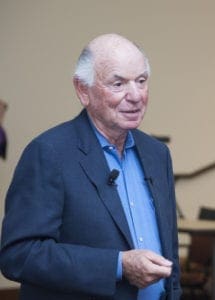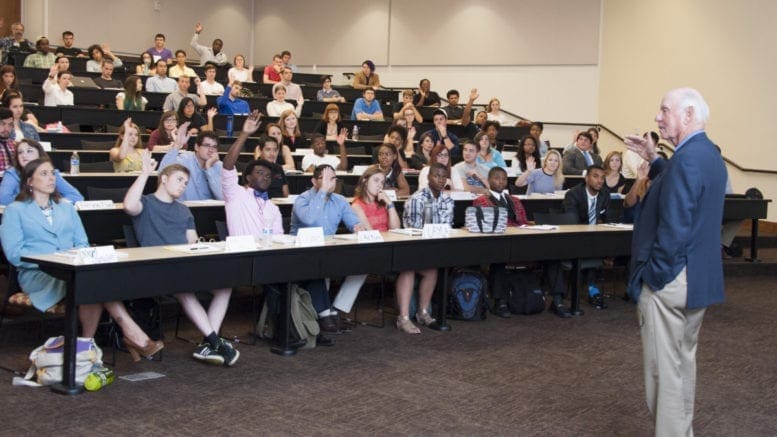- Donor Mike Leven approached KSU President Sam Olens in May about restructuring the hospitality degree.
- The Leven School of Culinary Sustainability and Hospitality will be phased out through 2021 and replaced by a Management, Entrepreneurship and Hospitality program in the business college.
- Olens reportedly told faculty at a meeting in October that he knew nothing about the closure of the culinary school.
- Despite announcements made to students, KSU has not yet finalized the deactivation of the CSH program with the state’s Board of Regents.
After a sudden announcement last week that Kennesaw State was shutting down its Culinary Sustainability and Hospitality school, the program’s namesake confirmed that he initially suggested the restructuring of the program.
No new students will be allowed to declare CSH as their major moving forward, but current students within the Michael A. Leven School of Culinary Sustainability and Hospitality will be given four years to complete their degree before the school closes completely.
A new program will open in July 2018 within the Coles College of Business, called the Michael A. Leven School of Management, Entrepreneurship and Hospitality.
First announcements to students
University College dean Lynn Disbrow emailed the first announcement to students and faculty within the school on Wednesday, Oct. 25. This email originally said the CSH degree would only offer courses for another three semesters, and students who could not graduate within that timeframe would need to switch majors.
But Thursday evening, Oct. 26, Disbrow sent an updated announcement and clarified that the provost had approved the program to offer courses to current CSH majors through spring 2021, giving students a full four years to complete their degree.
The University College has also created a page on its website with FAQs and updates about the discontinuation of the CSH program.
Donor steps in with suggestions
Mike Leven, the culinary and hospitality school’s namesake, said it was his idea to restructure the program and create a new degree within the business college. He pointed out that many hospitality programs across the country are housed within the business schools of their respective universities.
“I believe this is a very positive development for the students,” Leven said. “It will give the students a greater flexibility in hospitality. Also, hospitality has much of management and entrepreneurship in it.”
KSU first began offering a bachelor’s degree in culinary sustainability and hospitality in April 2013. Two years later, the Michael A. Leven School of Culinary Sustainability and Hospitality was established after Leven’s $5 million pledge to the program. This was the largest single contribution by a donor in KSU’s history.
In addition to feeling like KSU wasn’t equipped to compete with institutions that were devoted to teaching culinary arts, Leven wanted the focus to be the hospitality aspect of the program.
“I didn’t want to be only culinary,” Leven said. “Culinary could be part of the hospitality, but it shouldn’t be the total thing.”

Mike Leven first approached KSU President Sam Olens in May 2017 about restructuring the Leven school and moving the hospitality degree. (photo credit: David Caselli)
KSU provost Ken Harmon confirmed that Leven initiated conversations about the program with President Sam Olens earlier this year.
“Mr. Leven approached President Olens in May 2017 and mentioned he would like to see more of a business focus in the program,” Harmon said. “President Olens conferred with me and Dr. Kathy Schwaig, dean of the Coles College of Business, about this idea and discussed the possibility of moving the program to the Coles College of Business.”
Olens reportedly told faculty members otherwise, however, at a meeting last week. A faculty senate representative — who asked not to be named — confirmed that Olens told the group of instructors and lecturers on Monday, Oct. 23, that he did not know anything about the plans to close the CSH school.
“[Olens] said he didn’t have anything to do with it,” the faculty member said. “He said it was a decision made at the dean level.”
As of the publishing of this article on Nov. 1, minutes for the faculty senate meeting had not yet been released.
Addressing USG policies
When the Cobb County Courier first asked if the termination or deactivation of the CSH program had been approved by the Board of Regents, a university spokeswoman said Monday, Oct. 30, that the action did not require board approval.
After further prompting, provost Harmon said via email Wednesday, Nov. 1, that the university has created a plan to bring to the Board of Regents.
“The current plan is to deactivate the program. The first step in the process is a review by the curriculum committee,” Harmon said. “Following the review, KSU will notify the University System of Georgia office.”
According to the USG handbook, there is a clear difference between “deactivating” and “terminating” a degree program. Deactivation of a program lasts for a period not to exceed two years. This process can be completed by a university president without board approval, though the USG Office of Academic Programs should still be notified.
“If the suspension has not been (or will not be) lifted (i.e., the program has not been reactivated) by the end of the second academic year, the president should take action to terminate the program,” according to the handbook.
The plan for the CSH program, however, extends the course offerings for current majors for three and a half years.
If a program is deactivated, the handbook states that it “should not be listed in the college catalog,” though the CSH degree was still listed on KSU’s website as of Nov. 1. On the Board of Regents’ website, the degree listing is supposed to include a notation that the program has been deactivated, but the CSH program was listed as “active” as of press time.
“Currently, the plan is to terminate the program in 2021 after all current students have been given the opportunity to graduate,” Harmon said. “This decision would be brought to the [Board of Regents] for final approval at that time.”
Officials with the University System of Georgia did not respond to repeated requests for comment.
Faculty members feel the effects
The process for termination of a degree program requires several checks by the Board of Regents, one of which is “confirmation that termination of the program will not have an adverse impact on tenured and non-tenured faculty or students,” according to the handbook.
“The number of faculty hired to teach in the CSH program is based on the needs of the program,” Harmon said. “The number of faculty needed through 2021 will be assessed and hiring decisions will be made based on demand.”
One limited-term instructor, however, has already lost his job due to the closure of the school.
Learn more about his story and check back for updates at CobbCountyCourier.com.
